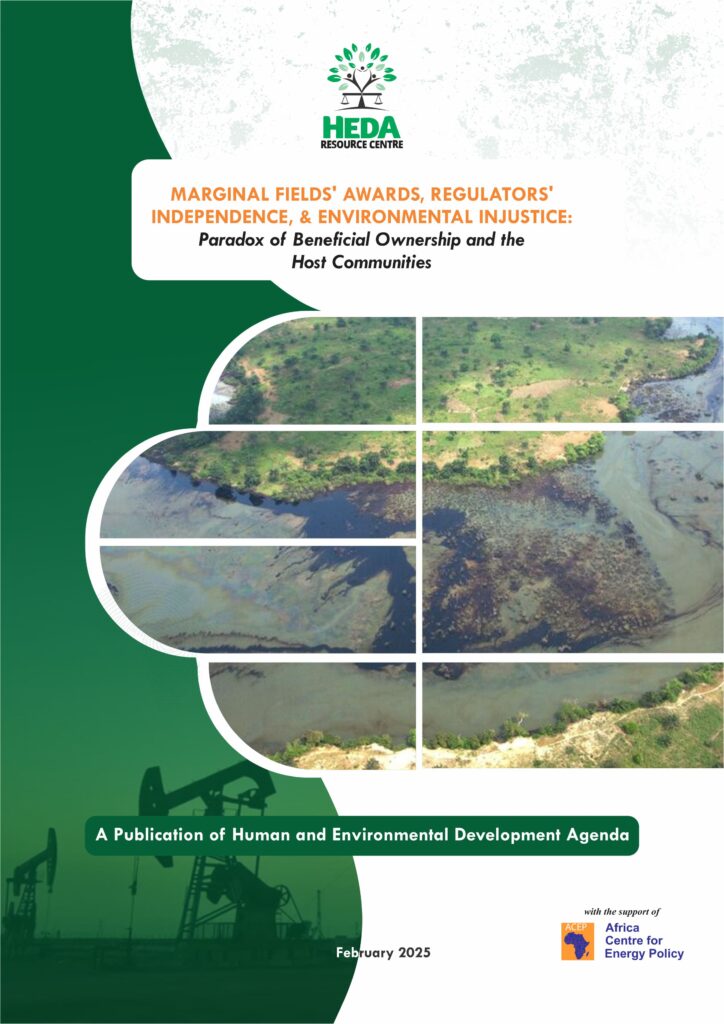Human and Environmental Development Agenda (HEDA) Resource Centre, a non-governmental and non-partisan human rights and development organisation established to provide leadership in advancing Human rights and environmental protection in public policy and programmed has launched a campaign tagged Food and Climate Justice.
The Executive Secretary of HEDA, Sulaiman Arigbabu said that the launch of the campaign is meant to drum up the issue of climate change impact on agriculture, particularly on the life of small scale farmers and rural people in Nigeria and Africa.
Arigbabu said further that essence of the campaign is to ask government to help to stop climate change and reduce emission so that global average temperature doesn’t go beyond bearable limit.
According to him “The impact of emission over 100 – 200 years ago we are feeling now means that we have to help communities, vulnerable people, farmers to adapt to the impact of climate change for them to find the support system, resource, technology to survive at this tough time. There will be no food for people if farmers are threatened with climate change”.
He called on government and citizens to join in the campaign to act for climate justice such that the international communities can reach an agreement on cutting down emission on supporting adaptation in countries in Africa and other parts of world.
The Permanent Secretary of the Ministry of Environment, Honourable Hakeem Ogunbambe said the responsibility of the ministry has been intensified on public sensitization and enlighten the people on what they are doing to ensure better life for farmers and the people in the state.
“We work for you and we are public servant and we hold a duty to keep you and your children safe and alive. If you put your waste in drainage it comes back to you because it will cause flood problem”, she advised.
Ogunbambe reiterated further the achievements of the ministry to combating climate change.
“We have also established the climate change department which is the first department that was created in any state in Nigeria, Organised climate change summit every year to let people know what it entails, We have climate change clubs in schools and we have over 30,000students that are members of climate change club and we take them to Germany on school exchange program. In the last flood case, we have planted over 5 million trees to fight climate change”, she revealed.
He urged every Lagosians to inculcate the habit of giving out seed leaf as gift to people to plants to prevent flood and other natural disaster in the state.
Speaking on behalf of the rice farmers in Lagos State, the National Vice-President Rice Farmer Association in Southwest, Segun Atho said the being a farmer in the state is stressful because there is government support for them to enhance their rice production.
Atho wants the state government to support their corporative society to source3 for loan and credit facilities.
“We have 30,000 registered corporative thrift societies in the state, even if they cannot give money to farmers in forms of loans, they should source for money for us in Lagos state. From there, people can venture into any agricultural value chain in the state, we have marketing, production and processing, If government can encourage people to go into all these value chain, we will reduce wastage in the state”, he urged
He urged the government to increase allocation to farmers in the area of budgetary to increase rice production in the country and be sincere in the way they make policies.
One of the participants at the campaign, Victoria Bolujoko urged the government to establish Nigeria agricultural development bank to all the local government in the state.
According to her, “there are only 3 branches in the whole Lagos State, The percentage is just 10% per annum without collateral. I am staying in Ojo, how will I go to Badagry to source for loan. Lagos State government should talk to Federal Government to establish the bank in all the councils in Lagos so that all farmers benefits from the loan”, she said.
In her presentation, the represebtative of Oxfam Funmi Tseminor revealed that out of countries that promised that poverty will be eradicated by 2015, only nine of them are really investing in their agricultural sector and out of nine, it is only four that are using 10% of their budget in the agricultural industry.
She said that the most people that are affected by poverty are small scale farmers and they are the people that produce what we eat.
Tseminor wants people to venture into the sector because of the opportunities in it and wants government put more effort to improving agricultural sector and empowering small scale farmers that constitute farmers feed the nation.



